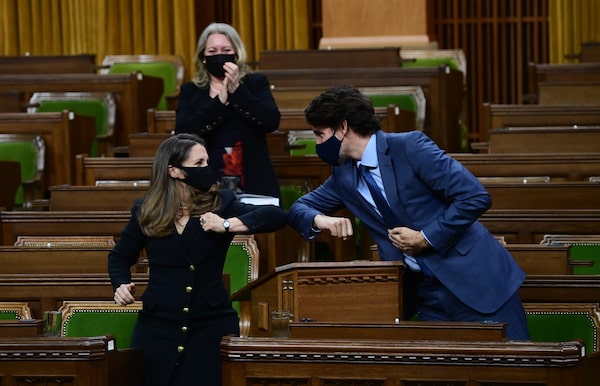
Finance Minister Chrystia Freeland and Prime Minister Justin Trudeau bump elbows after she delivered the federal budget in the House of Commons in Ottawa on April 19, 2021.Sean Kilpatrick/The Canadian Press
As the federal election campaign kicks off, hard-core fiscal issues are a second-tier concern, pollsters say, despite an unprecedented surge in Ottawa’s spending, deficits and debt during the pandemic.
But that doesn’t mean Canada’s fiscal situation won’t be a prominent part of the campaign. There are opportunities for political parties, particularly the Conservatives, to link those concerns with swirling anxiety over health care and the cost of living.
The good news for the Tories is that there is a substantial slice of the electorate – about a third – that ranks the deficit, the economy and taxation as top issues, says Shachi Kurl, president of the Angus Reid Institute.
The bad news: Most of the rest of the electorate is focused on other issues, with left-of-centre voters much more preoccupied with the rise in their cost of living rather than the increase in Ottawa’s debt load. “It’s very much a tale of two planets,” Ms. Kurl says.
The deficit and government spending had been an issue of growing concern in the Liberals’ first term, peaking in the spring of 2019, as the chart below shows.
Worries over the debt and deficit were already waning before the COVID-19 pandemic but tumbled further through 2020 as Canadians seemingly accepted the necessity, at least in the short term, for spending and deficit levels that would have been previously seen as politically implausible. There was “almost unblinking” support for high spending as the pandemic raged in 2020, said Frank Graves, president of Ekos Research.
Ms. Kurl says there is some opportunity for the Conservatives to poach votes from the Bloc Québécois, since supporters of that party tend to cite the economy as one of their chief concerns.
Greg Lyle, president of Innovative Research Group Inc., paints a similar picture, with his polling showing that health care and the cost of living are the issues of greatest concern to voters. As the chart below shows, 62 per cent and 60 per cent, respectively, of respondents in a recent Innovative Research poll indicated those issues are among their top three concerns. The debt and deficit are in the second rank of issues, with just under a third of respondents saying that was among their top three issues.
It would be a mistake for the Conservatives to make attacks on the Trudeau government’s deficit and debt record the central point of a campaign, Mr. Lyle said.
But that does not mean that fiscal issues are irrelevant, he added. It does mean that any party wanting to attack the Liberals’ fiscal record will need to build a bridge to those more resonant issues, he said. That could mean, for instance, pushing a message that the increase in spending during the pandemic and beyond threatens to increase inflation, and interest rates on mortgages, Mr. Lyle noted. If successful, that strategy would link concerns over the cost of housing with the Liberals’ fiscal record. But the Conservatives face a challenge in convincing voters that there are looming consequences for Ottawa’s spending.
One part of the Liberal fiscal record that is likely to resonate with voters: The move to launch a federally funded expansion of child care, a policy that takes square aim at voters concerned with the cost of living (or at least those with young children). The best option for the Conservatives is likely to say that they would continue to enact that policy, Mr. Lyle said.
But there is a policy vacuum on seniors’ care, he said, with no party yet outlining how they would reform funding for elderly Canadians in long-term care. “Somebody has got to say something about funding seniors’ care,” he said.
Ekos’s Mr. Graves sees fiscal matters as an area of potential vulnerability for the Liberals, with concern over spending “quite significantly” increasing over the past six to seven months. There is still a plurality of voters that are comfortable with the Liberal message that continued high deficit spending is needed, and not risky because interest rates are low.
But Mr. Graves said that argument is becoming increasingly less persuasive, with a growing contingent of voters believing that even though higher spending and big deficits were justifiable during the pandemic, there will eventually be consequences, whether they be spending cuts or tax increases. “People are really not buying the argument ‘don’t worry, this is all going to be fine,’ ” he said.
Worries about the long-term fiscal outlook aren’t likely to top other issues – particularly the overarching concern of the coronavirus – in a fall vote, he said. Barring a surge in the economy, those fiscal worries could continue to grow and become a political liability for the Liberals in a later election, Mr. Graves said. “They’re kind of juggling this.”
Tax and Spend examines the intricacies and oddities of taxation and government spending.
Sign up for the Tax and Spend newsletter.
 Patrick Brethour
Patrick Brethour